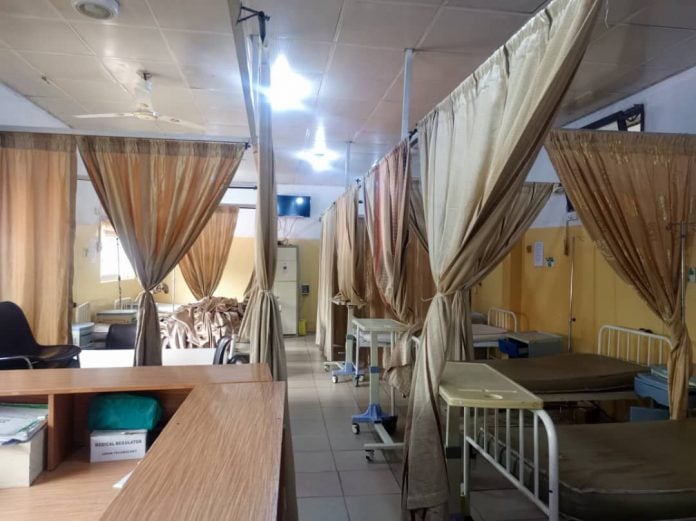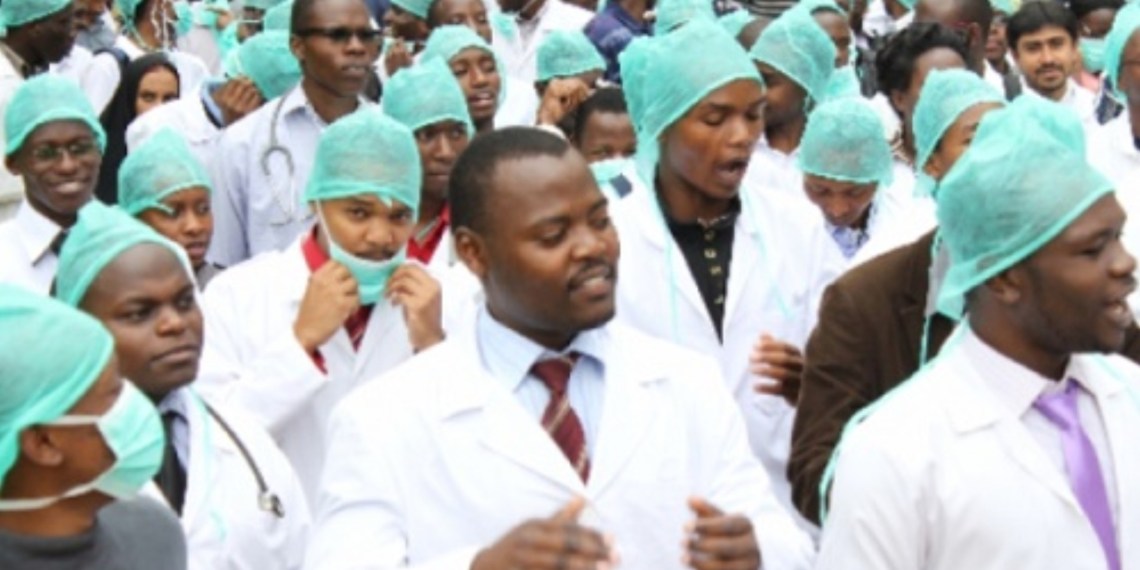On Monday, hospitals across Abuja were thrown into crisis as pregnant women, children, and elderly citizens found themselves stranded without medical care. The disruption came after resident doctors under the Association of Resident Doctors (ARD) in the Federal Capital Territory Administration (FCTA) began an indefinite strike, following the expiration of a previous seven-day warning strike. The move has heightened anxiety among patients and families who rely on public hospitals for essential healthcare.
The Standoff: Why FCT Doctors Are on Strike
Tensions between the ARD and the FCTA have been simmering for months. According to a communique signed by the ARD-FCTA President, Dr. George Ebong, and the General Secretary, Dr. Agbor Affiong, the strike was triggered by a series of unmet demands despite several rounds of negotiations with health authorities.
The doctors outlined key grievances, including:
- Unpaid salary arrears ranging from one to six months for members hired since 2023.
- The need for immediate recruitment of additional healthcare staff to relieve overburdened workers.
- Settlement of the forthcoming 2025 Medical Residency Training Fund.
- Payment of arrears resulting from a 25-35% upward review in the Consolidated Medical Salary Structure (CONMESS).
- Clear, documented timelines for completing critical administrative processes like skipping and staff conversion.
- The elimination of persistent and erroneous deductions from salaries, and the institution of a stable, predictable salary disbursement system.
- Timely conversion of post-Part II Fellows to Consultant status, within six months of passing exams, along with full payment of promotion arrears.
- Settlement of wage award and hazard allowance arrears, and modernization of FCTA-run hospitals to a global standard.
- Addressing unpaid salaries, specifically for newly employed external residents still waiting for three to four months’ worth of wages.
Citing the repeated lack of progress, the ARD Congress decided at the end of the warning strike to escalate to an indefinite work stoppage until authorities demonstrate real commitment to addressing these longstanding issues.
Impact on Abuja Hospitals: Patients Left in Limbo
The immediate fallout from the strike has been harsh. Visits to major health facilities such as Wuse, Asokoro, and Maitama District Hospitals revealed wards emptied of patients and relatives wandering hospital corridors in confusion and frustration. Multiple areas—including the female medical ward, gynaecology ward, emergency paediatric ward, and general surgical wards—have discharged patients because of insufficient personnel to provide safe care.
At Wuse District Hospital, desperate parents voiced their concerns:
- Mrs. Juliet Chima, whose five-year-old daughter was suffering persistent stomach pain after a recent malaria and typhoid treatment, said, “I paid N8,000 for registration, but was told no doctor could attend to us. Private hospitals are expensive. My daughter can’t even go to school today. It’s heart-breaking.”
- Another mother, struggling with two young children—one unwell, the other a baby—explained, “We were told to come today, but the strike made things worse. I’m forced to use oral rehydration at home for my child because I just can’t afford alternatives. The government really has to step in.”
- One parent recounted how her appeals in tears finally persuaded nurses at the physiotherapy unit to help her daughter with neck pain but noted, “Many others are not attended to at all.”
- Mr. Osadolor, a 69-year-old man seeking his annual medical check-up, expressed dismay, “I was told to return last week during the warning strike, but now nothing has changed. I hope the government listens to their demands.”
Voices from the Frontlines: Staff Struggles and Limited Care
While consultant doctors, nurses, and a small group of healthcare workers continued providing limited services, they were clearly overwhelmed by the patient load. Immunization and birth registration services continued—mostly for babies and young children—but more comprehensive care was simply not possible. The female surgical wards were closed completely, and access was tightly restricted.
Similar stories emerged from Asokoro District Hospital. One woman, who had been asked to return weeks after a postponed prenatal appointment, said the absence of doctors shocked her. Her husband, Mr. Obinna, told reporters, “We followed the hospital’s instructions. Only to hear that the indefinite strike is still on. The FCT Minister has to act fast.” Another expecting mother reported waiting for hours before being told to go home, while a third explained that lab results for her son’s fitness check couldn’t be reviewed due to the doctor’s absence.
The Human Cost: Risk for Vulnerable Patients
The brunt of the strike is falling on society’s most vulnerable—pregnant women needing antenatal care, sick children, elderly patients with chronic conditions, and surgical cases abruptly discharged. Various wards at Maitama Hospital, including the labour, female, male, paediatric, and ante-/post-natal wards, were observed to have emptied out. Only a lone consultant doctor was on duty at the General Outpatients Department, unable to meet demand.
Mrs. Ojuolape Abe, a mother of twins seeking treatment for her children, summed up the mood: “I was just told the doctors are on strike and there’s nothing they can do.” She emphasized that a persistent lack of healthcare services could easily translate to preventable complications and tragedies.
Why This Matters Across Nigeria and West Africa
While this strike is unfolding in Nigeria’s capital, similar issues resonate in public health sectors across West Africa. Understaffed and underfunded hospitals, wage delays, and facility decay affect millions of families, reflecting the broader challenge of healthcare delivery in the region. According to a 2022 report by the World Health Organization, sub-Saharan Africa faces a doctor-to-patient ratio well below international recommendations, and prolonged strikes can worsen already precarious health outcomes.
Ghana, for instance, has also faced periodic strikes from health workers demanding fair compensation or improved facilities. The interconnectedness of the West African health workforce—with many professionals migrating from one country to another for better prospects—means disruptions in Abuja can ripple out, impacting regional health stability and pushing up patient numbers in neighbouring countries.
Possible Solutions and What Comes Next
Solving these recurring crises calls for more than temporary salary settlements. Key policy recommendations from health experts and advocacy groups include:
- Implementation of robust funding mechanisms for residency training and staff welfare.
- Transparent staff recruitment and promotion with clear, enforceable timelines.
- Legislative action to ring-fence health budgets and guarantee timely salary payments.
- Investment in modernizing public healthcare infrastructure, from equipment to buildings.
- Active dialogue with unions to resolve grievances early, before they escalate.
Many Nigerians interviewed expressed hope that the FCT Minister and federal health authorities will act swiftly to address both immediate needs and lay a foundation to avoid similar disruptions in the future.
Broader Reflections and the Path Forward
The ongoing doctors’ strike is more than a labour dispute—it is a mirror reflecting the urgent reforms required in Nigeria’s public healthcare system, one that many in West Africa can relate to. Without focused and transparent reforms, such standoffs will continue to jeopardize lives and livelihoods.
The situation also raises crucial questions about the priorities attached to public health funding and the role of leadership in responding to life-and-death issues affecting ordinary citizens.
What is your perspective on the FCT doctors’ strike—who do you think should take urgent action: the FCT Minister, the doctors’ association, or federal authorities? How have disruptions in healthcare affected you or your loved ones?
Share your thoughts in the comments and stay updated—your voice matters in shaping Nigeria’s health policy dialogue.
We welcome real stories and opinions from Abuja, Nigeria, Ghana, and across the continent! Email story@nowahalazone.com to get your story featured or discuss story sales.
For general support, reach us at support@nowahalazone.com.
Follow us for more news, tips, and updates on Facebook, X (Twitter), and Instagram!
The health of our people is everyone’s concern. Add your voice to the conversation, and help push for lasting solutions.










